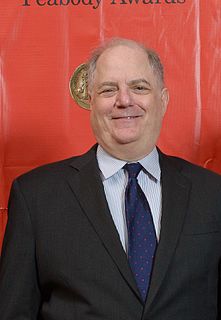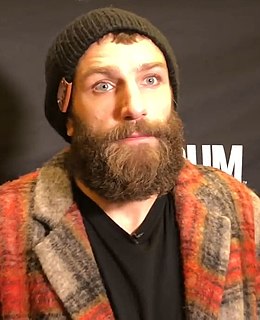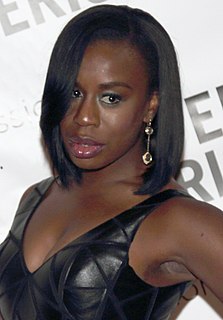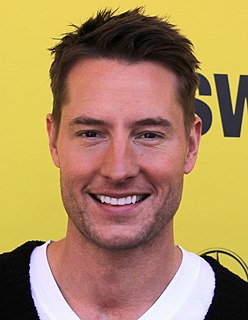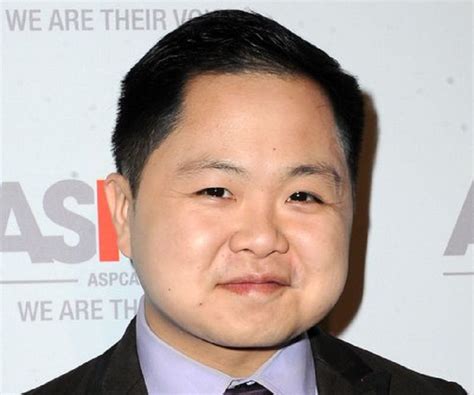Ein Zitat von Joel Edgerton
Irgendwann muss man die Verbindung trennen, wenn die Besessenheit, eine echte Person zu spielen, dem Film insgesamt im Wege steht. Gleichzeitig sind wir als Schauspieler alle daran interessiert, so nah wie möglich an die Realität heranzukommen, und alles, was man tun kann, um diese Transformation herbeizuführen, macht Spaß und ist für mich das Beste, was ich erreichen kann Weg von mir selbst macht Spaß. Es ist alles Teil des Kostüms, des Akzents und all dem Zeug. Es geht darum, näher heranzukommen, ohne den Standpunkt der Geschichte, die man erzählen möchte, zu beeinträchtigen.
Themen zitieren
Über
den Akzent,
die Schauspieler,
die weg
sind,
der Nähe
Kostüme
Nachteile
erzeugen, trennen
Gefühle
Spaß
, Wegkommen
, Weggehen,
Interesse,
Groß,
Ich
, Film,
Ich,
Obsession,
Reihenfolge,
Teil
, Person
, Spielpunkt,
Standpunkt
, Sicht,
Real,
Real, Person
, Echt, Ding,
Gleich,
Gleich, Zeit,
Einige
Geschichten,
Dinge
,
Erzählen Zeit,
Verwandlung,
Versuchen
,
Sichtweise,
Was
auch immer
Verwandte Zitate
Für mich besteht der spaßige Teil beider Jobs darin, immer zu versuchen, die Diskussion und Debatte irgendwie voranzutreiben. Der größte Spaß daran, als Theaterkritiker für die Times zu arbeiten, war immer, sich für etwas einzusetzen, das vielleicht anderen Leuten nicht gefiel, oder das unter unbekannten Umständen produziert wurde oder um sein Überleben kämpfen musste. Und ich würde in der Kolumne sagen, dass das, was ich zu tun versuche, in gewisser Weise damit zusammenhängt, dass ich versuche, für einen Standpunkt zu kämpfen. Ich versuche in keinem der beiden Berufe, ein Königsmacher zu sein, und möchte und sollte es auch nicht sein.
Du bist genauso wichtig wie die Dinge, die dir wichtig sind. Und ich war so zurückgeblieben, als ich versuchte, ihm wichtig zu sein. Die ganze Zeit über gab es echte Dinge, um die man sich kümmern musste: echte, gute Menschen, denen ich und dieser Ort am Herzen liegen. Es ist so leicht, stecken zu bleiben. Man verfängt sich einfach darin, etwas zu sein, etwas Besonderes oder Cooles zu sein oder was auch immer, bis zu dem Punkt, an dem man nicht einmal weiß, warum man es braucht; Du denkst einfach, dass du es tust.
Ich könnte 100 Seiten damit verbringen, die Welt, über die ich schreibe, kennenzulernen: ihre Konturen, wer meine Hauptfiguren sind, welche Beziehungen sie zueinander haben und einfach nur versuchen, ein Gefühl dafür zu bekommen, worum es in diesem Buch geht und um wen es geht . Normalerweise habe ich bei ca. 100 Seiten das Gefühl, verloren zu sein, zu viel Material zu haben und es ist an der Zeit, einige Entscheidungen zu treffen. Normalerweise setze ich mich an diesem Punkt hin und versuche, einen formellen Überblick zu geben und herauszufinden, was nicht funktioniert und was mich am meisten interessiert, wohin die Geschichte zu führen scheint.
Ich habe E-Mails von Lesern erhalten, die gesagt haben, dass sie von den Büchern emotional berührt wurden und das Gefühl haben, dass sie umweltbewusster und motivierter sind, mehr zu tun. Das macht mir also Hoffnung. Es ist zumindest ein Beweis dafür, was ich versuche – sehr intensive emotionale Erfahrungen zu vermitteln, indem ich sehr nah an den Gesichtspunkten der Charaktere bin, damit man es in seinem Körper spürt. Das ist eine Möglichkeit, den Standpunkt zu verdeutlichen, indem man eine emotionale Reaktion hervorruft.
Manchmal schreibe ich Musik, manchmal nicht. Ich denke, ich schreibe einfach mehr, was mir am Herzen liegt, und musikalische Dinge liegen mir am Herzen, und es macht Spaß, etwas zu schreiben, und wenn es Spaß macht, etwas zu schreiben, denkt man nicht darüber nach, welche Aussage man machen will oder auf welches Genre Sie sich konzentrieren möchten.
Ich denke, das liegt daran, dass ich echt bin. Innerhalb und außerhalb des Rings ist das, was Sie sehen, das, was Sie bekommen. Ich bin CM Punk. Ich versuche nicht, etwas zu sein, was ich nicht bin. Ich versuche nicht, die Leute anzulügen oder falsch zu sein. Ich versuche nicht, eine verrückte, ausgefallene Figur zu sein. Ich bin echt und sie wissen das zu schätzen. Alles, was ich sage, kommt von Herzen. Es ist alles echt.
Wenn man außerhalb des Camps trainiert, macht es Spaß, ich spiele herum, ich arbeite hart, aber ich habe Spaß. Wenn ich in dieses Camp komme, ist das ein 10-wöchiger Tunnelblick auf diesen Gegner. Man versucht, an seinen Stärken und Schwächen zu arbeiten und vor dem Kampf in verschiedenen Bereichen wirklich besser zu werden.
Die Leute kommen und sagen – und das ist beleidigend: „Wollen Sie jemals etwas anderes tun?“ Lust auf echte Schauspielerei? Oder eine echte Show?' Hier ist die Sache: Entweder Sie können sich darüber aufregen, oder Sie können erkennen, dass diese Person nicht versucht, Sie zu beleidigen. Sie sind im wahrsten Sinne des Wortes interessiert und stellen Ihnen eine Frage.
Wenn Sie ihn die ersten paar Male vorführen, versuchen Sie nur, den Film zum Laufen zu bringen, die Geschichte zum Fließen zu bringen und herauszufinden, wo Ihre Bereiche sind, in denen Sie genug Atem haben, um ein wenig zu lachen. Das machen Sie also bei den ersten zwei oder drei Vorführungen, und schließlich stellen Sie den Film ein und er funktioniert, und an diesem Punkt ist es 50/50, was lustig ist und was funktioniert. Manchmal gibt man etwas hinein und es stirbt so schnell ab, dass es den Film fast zunichte macht.
Ich habe es versucht. Ich kroch. Ich kam zu mir selbst. Ich habe versucht, in gewisser Weise darüber hinauszukommen – nach welchem Wort suche ich? - metaphorische Sprache in der Malerei und um etwas zu schaffen, das indexikalischer ist. Und damit meine ich, dass man, wenn man in die Bibliothek geht, eine Karteikarte vor sich hat, die auf ein Buch verweist, das in der Welt aktuell und real ist. Dieser Index bezieht sich also auf etwas Reales.
Interviewer: [Was machen Sie] In Echtzeit? Brian Molko: Ich schaue mir Placebo-Seiten an und es fällt mir furchtbar schwer, die Fans davon zu überzeugen, dass ich es wirklich bin. Niemand glaubt es jemals. Ich habe ungefähr vier Stunden damit verbracht, vertrauliche Details über mich preiszugeben, die ich einem Journalisten niemals erzählen würde, um zu beweisen, dass ich es bin.

